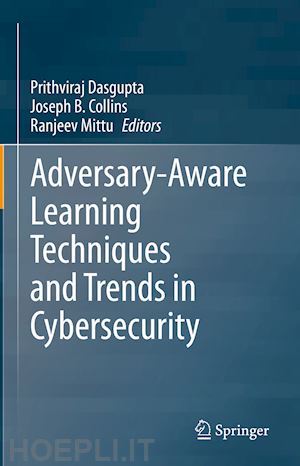
Questo prodotto usufruisce delle SPEDIZIONI GRATIS
selezionando l'opzione Corriere Veloce in fase di ordine.
Pagabile anche con Carta della cultura giovani e del merito, 18App Bonus Cultura e Carta del Docente
Part I: Game-Playing AI and Game Theory-based Techniques for Cyber Defenses
Rethinking Intelligent Behavior as Competitive Games for Handling Adversarial Challenges to Machine Learning
Joseph B Collins and Prithviraj Dasgupta
Security of Distributed Machine Learning:A Game-Theoretic Approach to Design Secure DSVM
Rui Zhang and Quanyan Zhu
Be Careful When Learning Against Adversaries: Imitative Attacker Deception in Stackelberg Security Games
Haifeng Xu and Thanh H. Nguyen
Part II: Data Modalities and Distributed Architectures for Countering Adversarial Cyber Attacks
Adversarial Machine Learning in Text: A Case Study of Phishing Email Detection with RCNN model
Daniel Lee and Rakesh M. Verma
Overview of GANs for Image Synthesis and Detection Methods
Eric Tjon, Melody Moh and Teng-Sheng Moh
Robust Machine Learning using Diversity and Blockchain
Raj Mani Shukla, Shahriar Badsha, Deepak Tosh, and Shamik Sengupta
Part III: Human Machine Interactions and Roles in Automated Cyber Defenses
Automating the Investigation of Sophisticated Cyber Threats with Cognitive Agents
Steven Meckl, Gheorghe Tecuci, Dorin Marcu and Mihai Boicu
Integrating Human Reasoning and Machine Learning to Classify Cyber Attacks
Ying Zhao and Lauren Jones
Homology as an Adversarial Attack Indicator
Ira S. Moskowitz, Nolan Bay, Brian Jalaian and Arnold Tunick
Cyber-(in)security, revisited: Proactive Cyber-defenses, Interdependence and Autonomous Human Machine Teams (A-HMTs)
William Lawless, Ranjeev Mittu, Ira Moskowitz, Donald Sofge and Stephen Russell











Il sito utilizza cookie ed altri strumenti di tracciamento che raccolgono informazioni dal dispositivo dell’utente. Oltre ai cookie tecnici ed analitici aggregati, strettamente necessari per il funzionamento di questo sito web, previo consenso dell’utente possono essere installati cookie di profilazione e marketing e cookie dei social media. Cliccando su “Accetto tutti i cookie” saranno attivate tutte le categorie di cookie. Per accettare solo deterninate categorie di cookie, cliccare invece su “Impostazioni cookie”. Chiudendo il banner o continuando a navigare saranno installati solo cookie tecnici. Per maggiori dettagli, consultare la Cookie Policy.